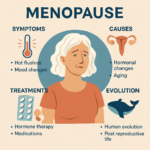
Obsessive-Compulsive Disorder (OCD) is a complex mental health condition that affects millions of people worldwide. Often misunderstood, OCD is characterized by persistent, unwanted thoughts (obsessions) and repetitive behaviors or mental acts (compulsions) that individuals feel driven to perform. In this blog, we will delve into some intriguing facts about OCD, shedding light on its symptoms, causes, and the impact it has on daily life. Whether you’re looking to understand OCD better for yourself, a loved one, or simply out of curiosity, this exploration aims to provide valuable insights into this often-misrepresented disorder. Join us as we uncover the realities of OCD and dispel some common myths along the way.
OCD affects approximately 2-3% of the global population. This statistic translates to millions of individuals worldwide who endure the complexities of this mental health condition. It is crucial to recognize that OCD is not just a quirk or a personality trait; it is a serious disorder that can significantly impact a person’s quality of life. The prevalence of OCD highlights the need for awareness, understanding, and effective treatment options for those affected.
OCD can develop at any age, but symptoms often appear between ages 8 and 12 or during late teens to early adulthood. This developmental timeline suggests that early intervention can be pivotal in managing the condition effectively. Children and adolescents may struggle with their symptoms in school or social settings, making it essential for parents and educators to recognize the signs early on. Early detection can lead to tailored therapeutic approaches that address the unique needs of younger individuals.
OCD is equally common among men and women, with both genders experiencing similar symptoms and challenges. This equality in prevalence indicates that OCD does not discriminate based on gender, which can help eliminate stigma surrounding the condition. Understanding that both men and women can face the same struggles may encourage more open discussions and support systems for those affected, regardless of their gender identity.
The exact cause of OCD is unknown, but it is believed to involve a combination of genetic, neurological, behavioral, cognitive, and environmental factors. This multifaceted nature of OCD complicates the understanding of its origins. Research suggests that individuals with a family history of OCD or related disorders may have a higher risk of developing the condition. Additionally, brain imaging studies have indicated abnormalities in certain areas of the brain, further emphasizing the need for comprehensive research to unravel the complexities of OCD.
Common obsessions in OCD include fear of contamination, fear of harming oneself or others, and intrusive thoughts about taboo subjects. These obsessions can be distressing and persistent, leading individuals to experience significant anxiety and discomfort. The nature of these thoughts often makes them particularly challenging to manage, as they can feel uncontrollable and overwhelming. Understanding the types of obsessions can help in developing targeted therapeutic strategies to address them.
Common compulsions associated with OCD include excessive cleaning, checking, counting, and arranging items in a specific order. These compulsive behaviors are often performed as a means to alleviate the anxiety triggered by obsessions. Individuals may feel compelled to engage in these rituals to prevent perceived negative outcomes, even when they recognize that their actions are irrational. The cycle of obsession and compulsion can be exhausting, consuming significant amounts of time and energy.
People with OCD often recognize that their obsessions and compulsions are irrational, but they feel powerless to stop them. This awareness can lead to feelings of frustration, shame, and helplessness. The internal struggle between wanting to resist compulsions and the overwhelming urge to perform them can exacerbate anxiety levels. This insight into their condition can be both a burden and a motivator for individuals seeking help and treatment.
OCD symptoms can interfere with daily activities and relationships, as the time-consuming nature of compulsions can disrupt normal life. Individuals may find themselves unable to complete tasks or maintain relationships due to the demands of their condition. This interference can lead to isolation, decreased productivity, and strained connections with loved ones. Recognizing the impact of OCD on daily functioning is essential for fostering understanding and support.
Diagnosis of OCD typically involves a thorough evaluation by a mental health professional, including interviews and questionnaires. Accurate diagnosis is crucial for effective treatment, as it ensures that individuals receive the appropriate interventions tailored to their specific symptoms. Mental health professionals may use standardized assessment tools to gauge the severity and impact of OCD, helping to develop a comprehensive treatment plan.
Cognitive-behavioral therapy (CBT), particularly Exposure and Response Prevention (ERP), is considered the most effective treatment for OCD. This therapeutic approach helps individuals confront their fears gradually while learning to resist the compulsive behaviors associated with their obsessions. Through structured exposure to anxiety-provoking situations, individuals can build resilience and reduce the power of their compulsions over time. CBT and ERP have shown significant success in improving the quality of life for those with OCD.
Medications, such as selective serotonin reuptake inhibitors (SSRIs), are often prescribed to help manage symptoms of OCD. These medications work by balancing brain chemicals, particularly serotonin, which can help alleviate anxiety and reduce obsessive thoughts. While medication can be an effective component of treatment, it is often most beneficial when combined with therapy. Individuals should work closely with their healthcare providers to find the right medication and dosage for their needs.
In severe cases, other treatments like deep brain stimulation (DBS) or transcranial magnetic stimulation (TMS) may be considered. These advanced treatments are typically reserved for individuals who have not responded to traditional therapies or medications. DBS involves implanting electrodes in specific brain areas to regulate abnormal activity, while TMS uses magnetic fields to stimulate nerve cells in the brain. Both of these treatments represent cutting-edge approaches for OCD management and are supported by research indicating their efficacy in reducing symptoms for those with severe or treatment-resistant OCD. However, they are generally considered after other treatment options have been exhausted and require careful evaluation by mental health professionals.
OCD can significantly impact academic and work performance, as the time spent on compulsions can reduce productivity. Individuals may struggle to concentrate on tasks, meet deadlines, or participate fully in workplace activities due to the distractions posed by their obsessions and compulsions. This impairment can lead to decreased performance, missed opportunities, and even job loss in severe cases. Understanding the impact of OCD on functioning is crucial for creating supportive environments that accommodate the needs of affected individuals.
Relationships can be strained due to the demands of OCD, as partners, family, and friends may struggle to understand the condition. The compulsive behaviors associated with OCD can create tension, frustration, and confusion among loved ones, who may feel helpless or unsure of how to provide support. Open communication and education about OCD can foster empathy and understanding, enabling families and friends to navigate the challenges together and maintain healthy relationships.
People with OCD may avoid certain places or situations to prevent triggering their obsessions. This avoidance behavior can limit their social interactions and lead to isolation, as individuals may withdraw from activities that they fear could exacerbate their symptoms. Over time, this avoidance can create a cycle of anxiety and reinforce the compulsive behaviors associated with OCD. Encouraging gradual exposure to feared situations, often within the framework of therapy, can help individuals regain confidence and reduce avoidance.
OCD can lead to physical health issues, such as skin problems from excessive washing or injuries from repetitive actions. These physical symptoms can add to the overall burden of the disorder, complicating treatment and recovery. For instance, individuals who engage in compulsive cleaning may develop dermatitis or other skin conditions due to frequent exposure to irritants. Recognizing the physical manifestations of OCD is important for comprehensive care that addresses both mental and physical health aspects.
David Beckham, the famous soccer player, has spoken about his struggles with OCD, particularly his need for symmetry and order. His openness about living with OCD has helped raise awareness of the condition and reduce stigma. By sharing his experiences, Beckham has shown that OCD can affect anyone, regardless of their success or fame. His candidness encourages others to seek help and fosters a sense of community among those who share similar struggles.
Howard Stern, the radio personality, has also shared his experiences with OCD, including his compulsions and how they affect his life. His willingness to discuss his condition publicly has contributed to greater awareness and understanding of OCD. By highlighting the challenges he faces, Stern provides a relatable perspective for individuals grappling with similar issues, reinforcing the importance of seeking support and treatment.
Leonardo DiCaprio portrayed a character with OCD in the film “The Aviator,” drawing from his own experiences with the disorder. This portrayal helped to bring mainstream attention to the complexities of living with OCD, showcasing both the struggles and the impact of the condition on daily life. The film serves as a reminder that mental health issues can affect anyone, including successful individuals, and emphasizes the importance of empathy and understanding.
Charlize Theron has discussed her OCD, particularly her need for cleanliness and order. Her honesty about her experiences helps break down stereotypes and misconceptions surrounding the condition. By sharing her journey, Theron encourages others to recognize the realities of OCD and to support those who may be struggling. Her openness contributes to a broader dialogue about mental health and the importance of seeking help.
Educating yourself about OCD can help you better understand what your loved one is going through. Knowledge fosters empathy and enables friends and family to provide informed support. By learning about the symptoms, treatment options, and challenges associated with OCD, individuals can create a more compassionate environment that encourages open communication and understanding. This education can also empower loved ones to advocate for appropriate treatment and resources.
Encouraging treatment and supporting therapy efforts can make a significant difference in the lives of those with OCD. Positive reinforcement and understanding can motivate individuals to stick with their treatment plans, whether through therapy, medication, or a combination of both. Family and friends play a crucial role in this process by providing encouragement and celebrating progress, no matter how small. Their support can help individuals feel less isolated and more empowered in their journey toward recovery.
Avoiding judgment and criticism is important when supporting someone with OCD. Negative reactions can increase anxiety and worsen symptoms, making it more challenging for individuals to cope with their condition. Instead, offering a non-judgmental space for individuals to express their feelings and experiences can foster trust and openness. Understanding that OCD is a mental health disorder can help loved ones approach the situation with compassion and patience.
FAQs about Obsessive-Compulsive Disorder (OCD):
1. What is OCD?
Answer: Obsessive-Compulsive Disorder (OCD) is a mental health condition characterized by the presence of obsessions and/or compulsions. Obsessions are intrusive and unwanted thoughts, images, or urges that cause significant anxiety or distress. Compulsions are repetitive behaviors or mental acts that individuals feel compelled to perform in response to their obsessions, often aimed at reducing anxiety or preventing a feared event. OCD can vary in severity and can significantly impact daily functioning.
2. What are the symptoms of OCD?
Answer: Symptoms of OCD can be broadly categorized into obsessions and compulsions. Common obsessions include fears of contamination, harming others, or losing control. Compulsions may involve excessive cleaning, checking, counting, or repeating actions. People with OCD often recognize that their obsessions are irrational but feel powerless to stop the compulsions. The symptoms can lead to significant distress and can interfere with personal, social, and occupational functioning.
3. What causes OCD?
Answer: The exact cause of OCD is not fully understood, but it is believed to be a combination of genetic, neurological, and environmental factors. Research suggests that abnormalities in brain structure and function, particularly in areas related to impulse control and anxiety regulation, may play a role. Additionally, family history of OCD or other anxiety disorders may increase the risk. Environmental factors, such as trauma or significant life changes, can also trigger or exacerbate symptoms.
4. How is OCD diagnosed?
Answer: OCD is diagnosed by a qualified mental health professional through a comprehensive evaluation, which may include a clinical interview and standardized assessment tools. The clinician will assess the presence of obsessions and compulsions, their severity, and their impact on daily functioning. The diagnosis follows criteria outlined in the Diagnostic and Statistical Manual of Mental Disorders (DSM-5).
5. What treatments are available for OCD?
Answer: Treatment for OCD typically involves a combination of psychotherapy and medication. Cognitive Behavioral Therapy (CBT), particularly Exposure and Response Prevention (ERP), is considered the most effective form of therapy for OCD. Medications, such as selective serotonin reuptake inhibitors (SSRIs), can also be effective in reducing symptoms. In some cases, other treatment options, such as transcranial magnetic stimulation (TMS) or intensive outpatient programs, may be recommended.
6. Can OCD be cured?
Answer: While there is currently no definitive cure for OCD, many individuals can achieve significant symptom relief and improved functioning through appropriate treatment. With ongoing therapy and support, many people learn to manage their symptoms effectively. It’s important for individuals with OCD to work closely with their healthcare providers to develop a personalized treatment plan.
7. How can I support someone with OCD?
Answer: Supporting someone with OCD involves understanding their condition and being patient and empathetic. Encourage them to seek professional help and be available to listen without judgment. Avoid enabling compulsive behaviors and instead help them focus on their treatment goals. Educating yourself about OCD can also help you provide informed support.
8. Are there any self-help strategies for managing OCD?
Answer: Yes, several self-help strategies can complement professional treatment. These include practicing mindfulness and relaxation techniques, maintaining a structured routine, challenging negative thoughts, and gradually facing fears through exposure exercises. Keeping a journal to track triggers and progress can also be beneficial. However, it’s essential to consult with a mental health professional before starting self-help strategies.
9. Is OCD the same as being a perfectionist?
Answer: While OCD and perfectionism can share some similarities, they are not the same. Perfectionism involves setting excessively high standards for oneself and feeling dissatisfied with anything less. In contrast, OCD is characterized by intrusive thoughts and compulsive behaviors aimed at reducing anxiety. People with OCD may struggle with perfectionism, but not all perfectionists have OCD.
10. Where can I find more information about OCD?
Answer: For more information about OCD, reputable sources include mental health organizations such as the International OCD Foundation (IOCDF), the Anxiety and Depression Association of America (ADAA), and the National Institute of Mental Health (NIMH). These organizations provide resources, support, and information about treatment options and research related to OCD.









